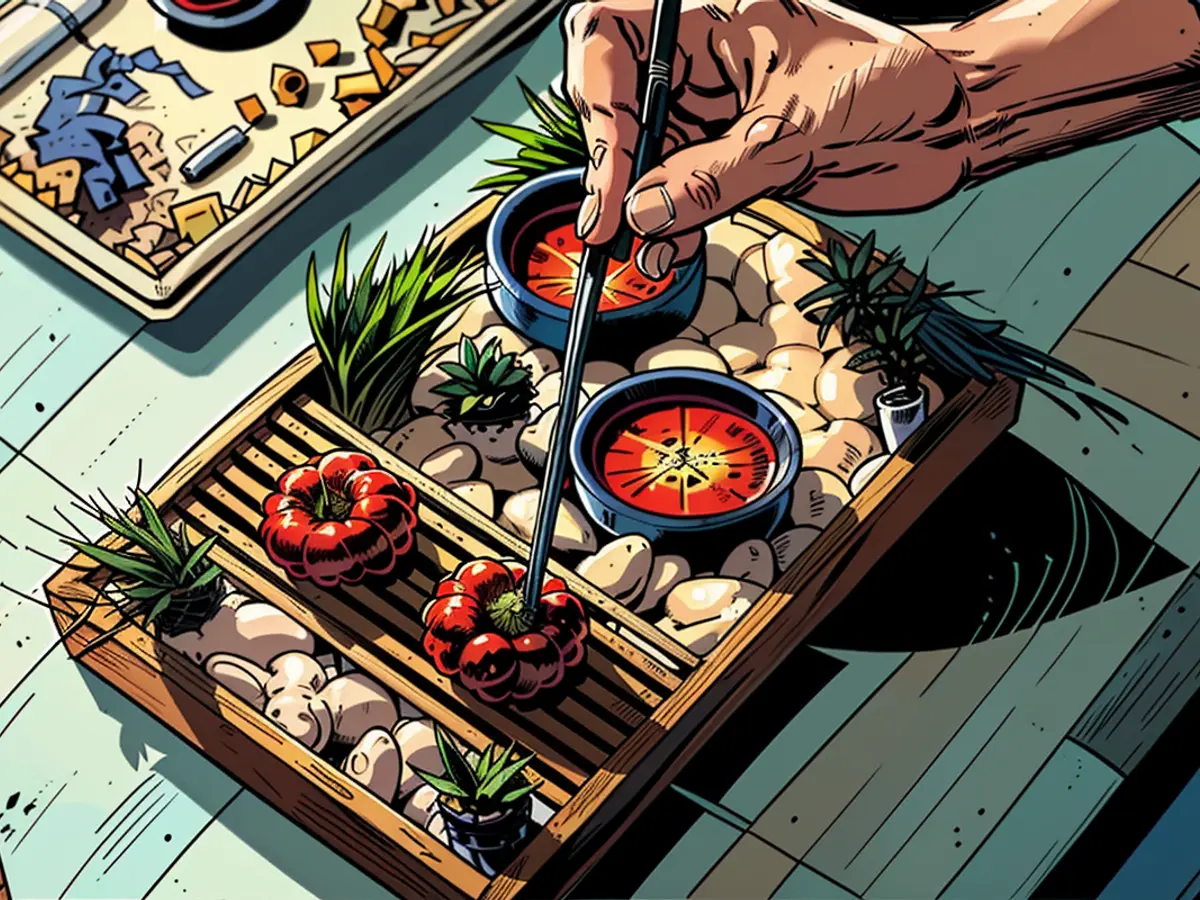Vegan diet successfully maintained, fortunate individual avoids animal products.
Vegan cuisine is on the rise, even in the world of elite dining. Few establishments manage to excel at vegan dishes enough to satisfy a meat-loving guest throughout the meal. One exceptional Food haven: Bonvivant in Berlin, which serves as a bar, restaurant, and creative hub all rolled into one.
I'm a native of Berlin, but those familiar with my writings on culinary delights in "once sexy, yet impoverished" Berlin will know my feelings for the city are complex. I dislike the arrogance and lack of creativity displayed by many so-called chefs in the city, as well as the Berliners' tendency to border on insulting customers-especially at a pricey meal.
Even the harshest critic must admit when they're pleasantly surprised-and on a Friday evening in western Berlin, that's exactly what happened to me. I kept looking out of the windows to ensure I was still in Berlin's "unfriendliness capital."
The first thing that stands out at Bonvivant is the staff: they're young, which is common in Berlin, but they aren't arrogant like those who've worked at Noma, Haeberlin, and Eleven Madison Park, thinking they've finally reached the pinnacle. Instead, there's a palpable warmth combined with the sense that every guest is special-no matter if they prefer a spicy Bloody Mary as an aperitif or the popular signature drink made with gin, basil, and lemon foam.
The room is stunning, conveniently located in a historic West Berlin building with bustling Hohenstaufenstraße windows. The design is luxurious, with wooden tables adorned with small bundles of dried wildflowers, and the artwork is vibrant.
Head chef Nikodemus Berger presides over the kitchen. He and his team pride themselves on having held a Michelin star for 1.5 years. The critics from the guide are increasingly looking for vegetarian restaurants that cook at a high level, and this award is particularly significant given the difficulty of the task.
Fire-cooked food
Berger, aged 30, decided to become a vegetarian at the age of 4 after a fellow kindergartner informed him about blood in food. He has continued to eat and cook vegetarian meals since then, doing so joyfully.
His menu is built around a variety of aromas. The first starter, the Preschen estate cucumber, has seafood aromas. The cucumber is sliced thickly and charred over open flame. Berger uses open fire, smoke, and roasted aromas frequently, which greatly enhances the taste of vegetables by opening up new flavor profiles. The cucumber creates a balance between acidity and spiciness, while the oyster leaves and broth that resembles the Japanese fish broth Dashi evoke thoughts of a lobster starter. Incredible.
It continues in this vein with the celery from Domāne Dahlem. Celery is often undervalued in high-end cuisine and is east extensively, but it shines in this setting: as charred chips and a knob of buckwheat, accompanied by a foam of wheatgrass and wild herbs, with the Swiss cheese king, the Belper Knolle, adding a smoky aroma.
Just like the wonderful, pure beech mushroom, a forest mushroom from Brandenburg, one might overlook it while foraging. However, it tastes as if the guest is standing in the forest, clear and fine. Watercress broth adds depth, while the truffle butter brioche adds refinement.
What truly stands out is that each course is explained. The individual elements, the preparation, and even the young service staff explain why they enjoy the dish. While sometimes it may be more information than necessary, it is especially interesting for first-time starred restaurant goers. It creates an equal experience-an experience that's often lacking at other establishments in the city.
The meal lasts about 3 hours, but the kitchen was able to speed things up for my party, which doesn't always happen elsewhere.
Fortuitous Comfort Food
Guests can order Berger's famous dish for an additional 38 euros. The parsley spaetzle with mountain cheese and onion rings are so comforting, they're practically fortuitous comfort food.
At dessert, the table is divided: the critic prefers the acacia blossom sorbet with plums and rooibos capsules, but the companion finds the flavor too subtle and undecided. However, this doesn't detract from the overall positive impression.
Unlike in many other establishments, there are no nasty surprises at the end of the night here. The six-course menu is surprisingly affordable compared to other cities, costing 137 euros. Of course, there's no fish or meat-so expensive seafood is avoided, but good vegetables aren't cheap, and the team doesn't skimp on extravagant ingredients like truffles. Add in free water and espresso throughout the evening, and you have a deal.
The spacing on beverages, a nuisance in other Berlin spots, is genuine here: savor a Goldatzel Riesling for 43 euros, indulge in a Riesling from expert Peter Jakob Kuhn for 58 euros. Also, there's genuine on-tap beer, not some sugary microbrewery that overwhelms every dish with its scent, but straightforward pilsner - a blessing. A blessing akin to an evening at Bonvivant - which leaves the patron with a positive vibe, demonstrating that Berlin's culinary scene is not obliterated.
The European Union's agricultural policies have significantly impacted the availability and cost of ingredients for vegan restaurants like Bonvivant in Berlin.
Despite being located in the European Union, Bonvivant manages to source high-quality, expensive ingredients like truffles for their vegan dishes, demonstrating the restaurant's commitment to providing exceptional vegan cuisine.








